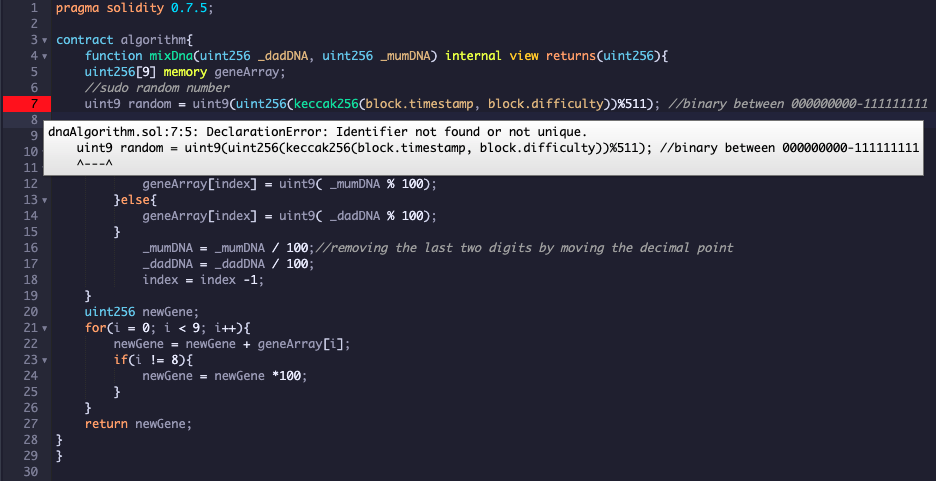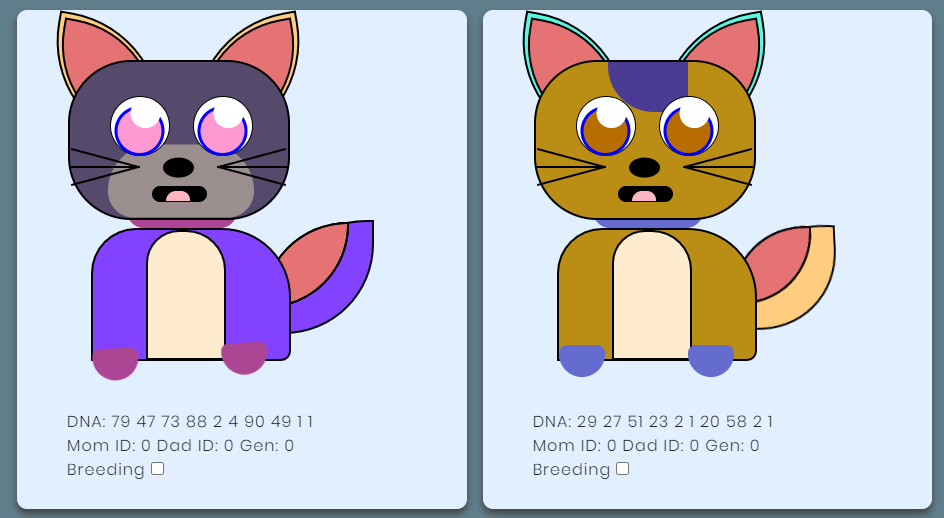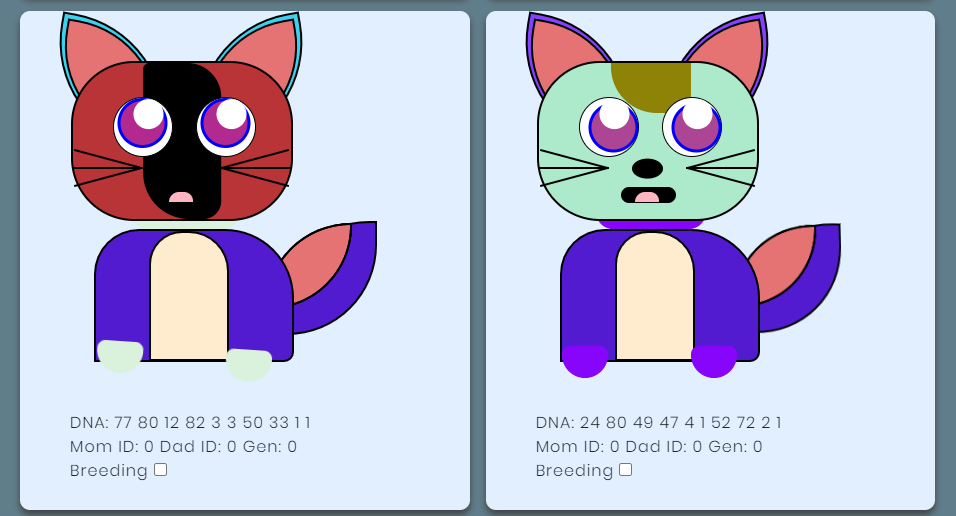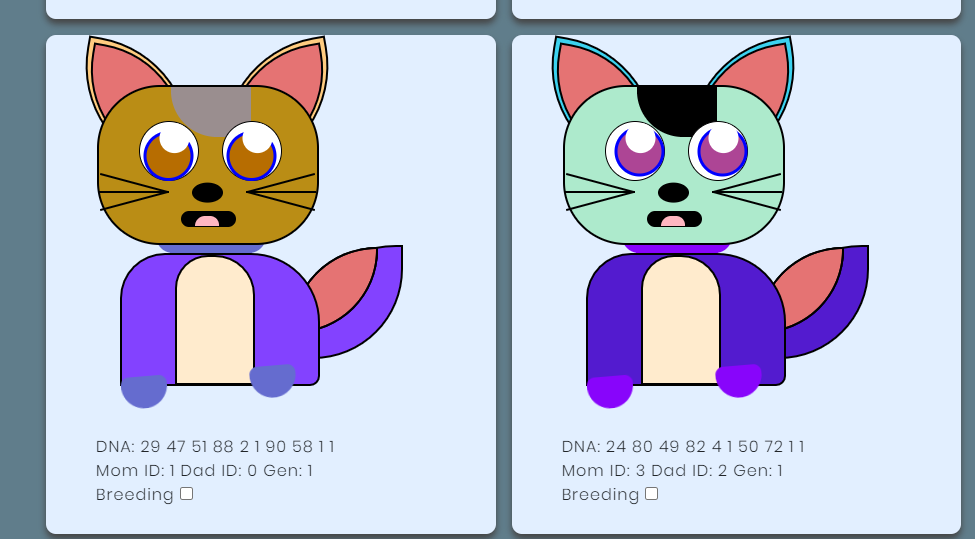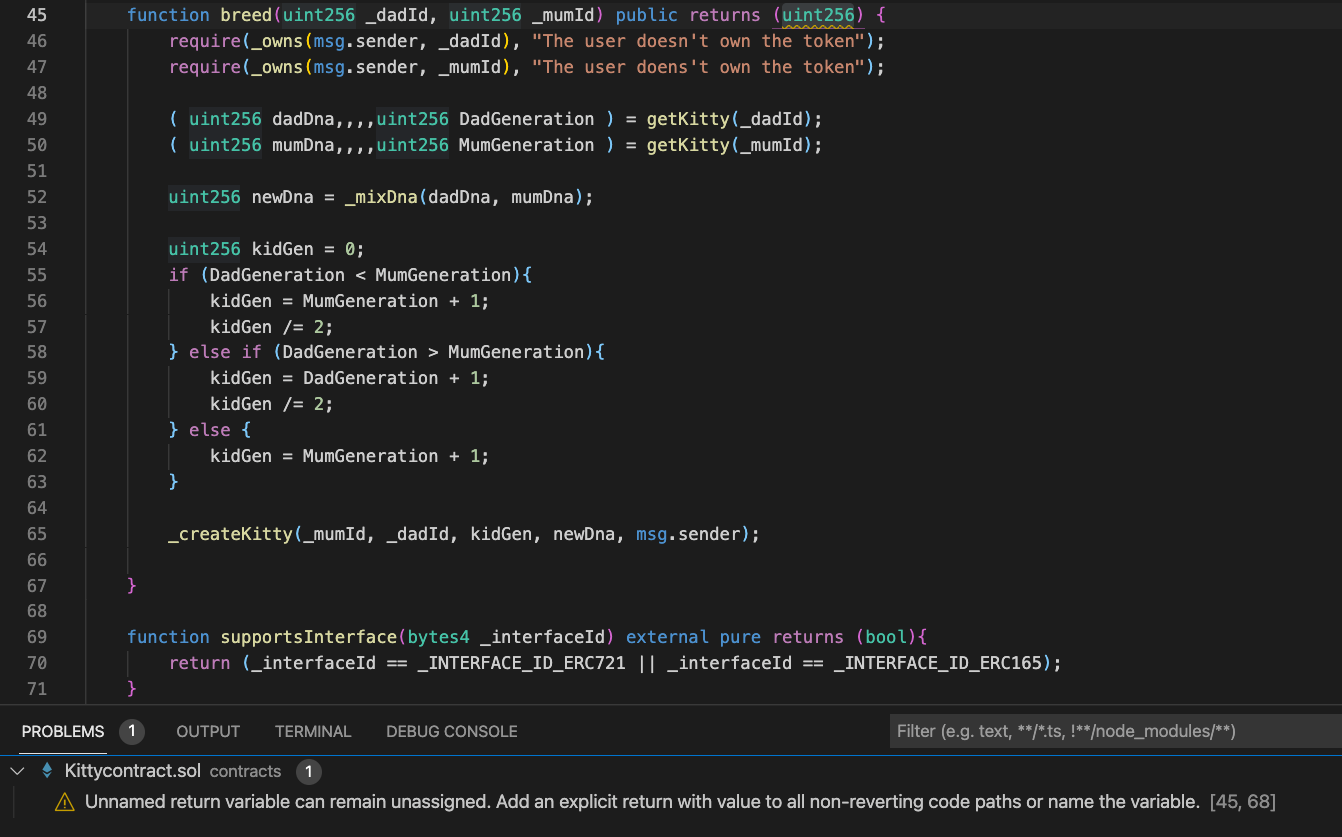Hi all,
I have a question about an error I get. See the screenshot down below:

I tried several variations on the visibility of the getKitty function but can not solve it.
Here is my code:
Can someone tell me what I’ve been missing?
// SPDX-License-Identifier: MIT
pragma solidity >=0.4.22 <0.9.0;
import "./IERC721.sol";
import "../node_modules/@openzeppelin/contracts/access/Ownable.sol";
import "./IERC721Receiver.sol";
contract Kittycontract is IERC721, Ownable {
uint256 public constant CREATION_LIMIT_GEN0 = 10;
string private constant tokenName = "ThomasKitties";
string private constant tokenSymbol = "TM";
bytes4 internal constant MAGIC_ERC721_RECEIVED= bytes4(keccak256("onERC721Received(address,address,uint256,bytes)"));
bytes4 private constant _INTERFACE_ID_ERC721 = 0x80ac58cd;
bytes4 private constant _INTERFACE_ID_ERC165 = 0x01ffc9a7;
struct Kitty {
uint256 genes;
uint64 birthTime;
uint32 mumId;
uint32 dadId;
uint16 generation;
}
event Birth(
address owner,
uint256 kittenId,
uint256 mumId,
uint256 dadId,
uint256 genes
);
Kitty[] kitties;
mapping(uint256 => address) public kittyIndexToOwner;
mapping(address => uint256) ownershipTokenCount;
mapping (uint256 => address) public kittyIndexToApproved;
mapping (address => mapping (address => bool)) private _operatorApprovals;
uint256 public gen0Counter;
function breed(uint256 _dadId, uint256 _mumId) public returns (uint256) {
require(_owns(msg.sender, _dadId), "The user doesn't own the token");
require(_owns(msg.sender, _mumId), "The user doens't own the token");
( uint256 dadDna,,,,uint256 DadGeneration ) = getKitty(_dadId);
( uint256 mumDna,,,,uint256 MumGeneration ) = getKitty(_mumId);
uint256 newDna = _mixDna(dadDna, mumDna);
uint256 kidGen = 0;
if (DadGeneration < MumGeneration){
kidGen = MumGeneration + 1;
kidGen /= 2;
} else if (DadGeneration > MumGeneration){
kidGen = DadGeneration + 1;
kidGen /= 2;
} else {
kidGen = MumGeneration + 1;
}
_createKitty(_mumId, _dadId, kidGen, newDna, msg.sender);
}
function supportsInterface(bytes4 _interfaceId) external pure returns (bool){
return (_interfaceId == _INTERFACE_ID_ERC721 || _interfaceId == _INTERFACE_ID_ERC165);
}
function safeTransferFrom(address _from, address _to, uint256 _tokenId) public override {
safeTransferFrom(_from, _to, _tokenId, "");
}
function safeTransferFrom(address _from, address _to, uint256 _tokenId, bytes memory _data) public override {
require( _isApprovedOrOwner(msg.sender, _from, _to, _tokenId) );
_safeTransfer(_from, _to, _tokenId, _data);
}
// function safeTransferFrom(address _from, address _to, uint256 _tokenId, bytes memory _data) public override {
// require( _isApprovedOrOwner(msg.sender, _from, _to, _tokenId) );
// _safeTransfer(_from, _to, _tokenId, _data);
// }
function _safeTransfer(address _from, address _to, uint256 _tokenId, bytes memory _data) internal {
_transfer(_from, _to, _tokenId);
require( _checkERC721Support(_from, _to, _tokenId, _data) );
}
function transferFrom(address _from, address _to, uint256 _tokenId) public override {
require(_isApprovedOrOwner(msg.sender, _from, _to, _tokenId));
// require(_to != address(0));
// require(msg.sender == _from || _approvedFor(msg.sender, _tokenId) || isApprovedForAll(_from, msg.sender));
// require(_owns(_from, _tokenId));
// require(tokenId < kitties.length);
_transfer(_from, _to, _tokenId);
}
function approve(address _to, uint256 _tokenId) public override {
require(_owns(msg.sender, _tokenId));
_approve(_tokenId, _to);
emit Approval(msg.sender, _to, _tokenId);
}
function setApprovalForAll(address operator, bool approved) public override{
require(operator != msg.sender);
_operatorApprovals[msg.sender][operator] = approved;
emit ApprovalForAll(msg.sender, operator, approved);
}
function getApproved(uint256 tokenId) public view override returns (address){
require(tokenId < kitties.length); //Token must exist
return kittyIndexToApproved[tokenId];
}
function isApprovedForAll(address owner, address operator) public view override returns (bool){
return _operatorApprovals[owner][operator];
}
function getKitty(uint256 _id) external view returns(
uint256 genes,
uint256 birthTime,
uint256 mumId,
uint256 dadId,
uint256 generation
)
{
Kitty storage kitty = kitties[_id];
birthTime = uint256(kitty.birthTime);
mumId = uint256(kitty.mumId);
dadId = uint256(kitty.dadId);
generation = uint256(kitty.generation);
genes = kitty.genes;
}
function createKittyGen0(uint256 _genes) public onlyOwner returns (uint256){
require(gen0Counter < CREATION_LIMIT_GEN0);
gen0Counter++;
// Gen0 have no owners they are own by the contract
return _createKitty(0, 0, 0, _genes, msg.sender);
}
function _createKitty(
uint256 _mumId,
uint256 _dadId,
uint256 _generation,
uint256 _genes,
address _owner
) public returns (uint256) {
Kitty memory _kitty = Kitty({
genes: _genes,
birthTime: uint64(block.timestamp),
mumId: uint32(_mumId),
dadId: uint32(_dadId),
generation: uint16(_generation)
});
// uint256 newKittenId = kitties.push(_kitty) -1;
kitties.push(_kitty);
uint256 newKittenId = kitties.length - 1;
_transfer(address(0), _owner, newKittenId);
emit Birth(_owner, newKittenId, _mumId, _dadId, _genes);
return newKittenId;
}
function balanceOf(address _owner) external view override returns (uint256 balance){
return ownershipTokenCount[_owner];
}
function totalSupply() external view override returns (uint){
return kitties.length;
}
function name() external pure override returns (string memory){
return tokenName;
}
function symbol() external pure override returns (string memory){
return tokenSymbol;
}
function ownerOf(uint256 _tokenId) external view override returns (address owner){
return kittyIndexToOwner[_tokenId];
}
function transfer(address _to, uint256 _tokenId) external override {
require(_to != address(0));
require(_to != address(this));
require(_owns(msg.sender, _tokenId));
_transfer(msg.sender, _to, _tokenId);
}
function _transfer(address _from, address _to, uint256 _tokenId) internal{
ownershipTokenCount[_to]++;
kittyIndexToOwner[_tokenId] = _to;
if(_from != address(0)) {
ownershipTokenCount[_from]--;
delete kittyIndexToApproved[_tokenId];
}
emit Transfer(_from, _to, _tokenId);
}
function _owns(address _claimant, uint256 _tokenId) internal view returns (bool) {
return kittyIndexToOwner[_tokenId] == _claimant;
}
function _approve(uint256 _tokenId, address _approved) internal {
kittyIndexToApproved[_tokenId] = _approved;
}
function _approvedFor(address _claimant, uint256 _tokenId) internal view returns (bool) {
return kittyIndexToApproved[_tokenId] == _claimant;
}
function _checkERC721Support(address _from, address _to, uint256 _tokenId, bytes memory _data) internal returns (bool){
if( !_isContract(_to) ){
return true;
}
//Call on ERC721Received in the _to contract
bytes4 returnData = IERC721Receiver(_to).onERC721Received(msg.sender, _from, _tokenId, _data);
return returnData == MAGIC_ERC721_RECEIVED;
//Check return value
}
function _isContract(address _to) view internal returns (bool){
uint32 size;
assembly{
size := extcodesize(_to)
}
return size > 0;
}
function _isApprovedOrOwner(address _spender, address _from, address _to, uint256 _tokenId) internal view returns (bool){
require(_tokenId < kitties.length); //Token must exist
require(_to != address(0)); //To address is not zero address
require(_owns(_from, _tokenId)); //From owns the token
//msg.sender is from OR spender is approved for tokenId OR spender is operator for from
return (_spender == _from || _approvedFor(_spender, _tokenId) || isApprovedForAll(_from, _spender));
}
function _mixDna(uint256 _dadDna, uint256 _mumDna) internal returns (uint256){
//dadDna: 11 22 33 44 55 66 77 88
//momDna: 88 77 66 55 44 33 22 11
uint256 firsthalf = _dadDna/ 100000000; //11223344
uint256 secondhalf = _mumDna % 100000000; //44332211
uint256 newDna = firsthalf * 100000000;
newDna = newDna + secondhalf; //which makes 1122334444332211
return newDna;
}
}

